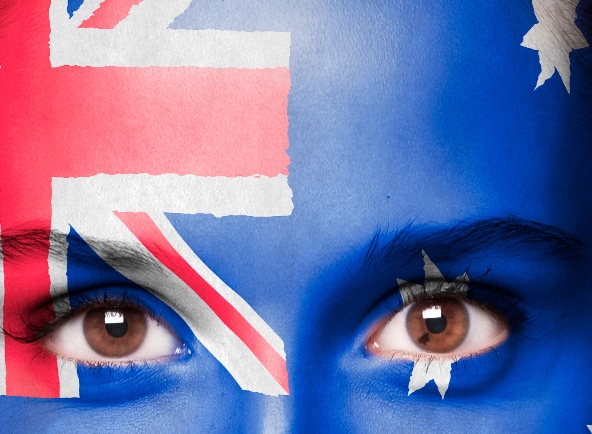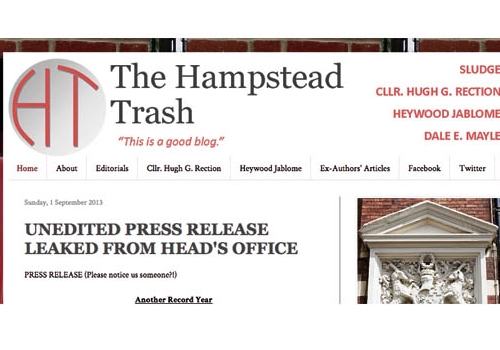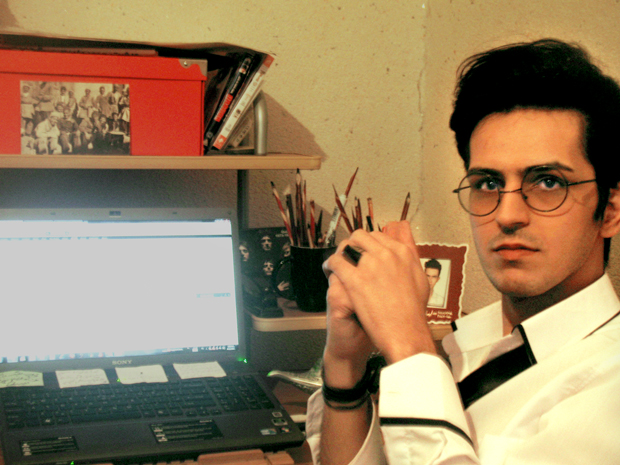From Assange to Murdoch: Australia’s free speech landscape

Australia has no grand constitution outlining civil freedoms and national character. The constitution is instead a lengthy, largely legislative document and does not guarantee freedom of speech or press outright. That notwithstanding Australia’s High Court believes that freedom of speech is implied within, however some press watchers believe it could be strengthened.
Despite a relatively free press Reporters Without Borders placed Australia at number 26 in its 2013 Press Freedom Index, up four spots from 2012 but still far behind closest neighbour New Zealand (number eight), as well as Finland, Jamaica and Costa Rica.
Outright press censorship and the highest profile cases of recent years have involved breaches of discrimination acts or incitements to hatred. Meanwhile press laws and reforms to them have been touted with scant success. Widespread internet censorship was defeated last year after Communications Minister Stephen Conroy rescinded the internet filtering scheme after five years trying to pass it.
However though always fearful of harming the children, and causing offence, most Australians see outright censorship measures as neither useful, fair or in keeping with national ideals.
A historical example might be the 1951 referendum on whether to outlaw the Australian Communist Party after Liberal Prime Minister Robert Menzies tried to ban it. Despite fear of the communist threat it was defeated by voters thanks to worries on curbs of freedom of speech and association.
Anti-discrimination laws, hate speech and other things untoward
In 2011 political columnist Andrew Bolt, who works for Murdoch-owned News Corp (Australia’s branch of News Limited), was found to have breached the Racial Discrimination Act in two 2009 articles after he implied lighter-skinned indigenous people identified as aboriginal for gain. Speaking outside court after the ruling he called it “a terrible day for free speech in this country”. He had argued his articles were within the laws of free speech provisions. In 2009 “shock jock” broadcaster Alan Jones was in trouble for breaching anti-discrimination laws for comments made about Lebanese Muslim men years previous. The court found he had incited hatred.
Age columnist Catherine Devenney was also fired after she live-Tweeted during the Logie television awards: “I do so hope Bindi Irwin gets laid” in 2010. Irwin was 13 at the time.
Most recently political organisation GetUp accused Channel Nine, Channel Ten and Channel Seven of censorship after they refused to run political ads attacking Rupert Murdoch and News Corp. Channel Nine did run the ads, albeit briefly, before pulling them and blaming a ‘coding error’ for the original airing.
National Director Sam McLean told Fairfax: “This is censorship, pure and simple. Channel Seven says it’s about taste but I don’t buy that for a second. Channel Ten told us they don’t want to criticise another media network – but this is about Rupert’s son Lachlan being [chairman] of Channel Ten.”
Reforms and laws
In March four media reform bills put forward by Labor under then-Prime Minister Julia Gillard were withdrawn after they couldn’t draw the needed amount of cross-bench support from MPs. All were controversial, with the ability to affect the press and drew considerable opprobrium from some quarters of the industry.
The most controversial, from an industry perspective, was the appointment of a Public Interest Media Advocate (PIMA), a watchdog for self-regulatory industry bodies like the Press Council. Called a “big stick… and de facto form of licensing” by Mark Pearson, a media expert and former Australian correspondent for Reporters Without Borders, and ‘Stalinist’ by News Ltd boss Kim Williams, it would have meant much more bureaucracy
“I find it absolutely breathtaking to be lectured by the Murdoch press about the privacy laws,” committee chairman Doug Cameron, a Labor senator, said in response to criticism by News Ltd boss Kim Williams.
Tony Abbott backed critics, calling it a threat to free speech. However in Parliament he seemed more concerned with the sitting government’s purported attacks on freedom of speech than how such laws might play out longer term. “This is a government which wants to hide the truth to protect itself. They don’t want to protect the national interest; they want to damage the national interest,” he said.
Two reports released this year have also been divisive. The Finklestein Report and Convergence Review looked at media regulation (by the government) and media ownership and diversity issues. The former has been lambasted as a threat to a free press, with national broadsheet the Australian noting that the paper had been compiled by many journalism academics either unused to or out-of-practise when it came to the rigours of day-to-day journalism and thus unreliable to offer advice. A Daily Telegraph front page compared Information Minister Stephen Conroy with famous dictators including Mao and Stalin.
Writing in The Conversation, Associate Professor of Journalism and Media at Deakin University Martin Hirst noted, “But the “threat to free speech” line is not an argument that the anti-regulation ideologues actually believe, it is a populist sound-bite.”
The Assange factor
Australia has done very little for Julian Assange, who harbours deep resentment as a result. Former Prime Minister Julia Gillard called the Australian a criminal and earlier pushed for a government inquiry into Wikileaks. Former attorney-general Robert McClelland also, according to the Australian Associated Press, at point thought of cancelling his passport and charging him with treason. Assange, though still confined within the the Ecuadorian embassy in London, is running for the Australian senate with his newly formed Wikileaks Party this coming election, and has told reporters support for him and his website within Australia is high.
Australian journalist Wilfred Burchett suffered similarly at the hands of the Australian government, being denied an Australian passport application in 1955 at Prime Minister Robert Menzies’ discretion (he had lost his British passport). He tried several times through the 1960s to no avail and was only granted one under a Gough Whitlam-led Labor government after they could find no support to the treason allegations that had dogged the pro-communist reporter for years. Though long dead he remains a divisive figure and most recently Australia historian Robert Manne published a story in The Australian alleging he really had been on the KGB’s books.
Media ownership
Australia’s two largest print media companies are News Corp and Fairfax, though both also have digital, radio and, in the case of News Limited, television interests. Australia’s wealthiest person Gina Rinehart bought a stake in Fairfax, but by 2012 was trying to offload despite being the biggest shareholder. She also bought a significant part of Channel 10, a commercial television network. These purchases had been touted for a while and worried many as Rinehart was seen as unfriendly to the press and with a strong right-wing agenda. She has argued against the controversial mining tax and also criticised high wages in Australia.
Despite owning a chunk of the press Ms Rinehart is not particularly friendly to it. Most recently she subpoenaed West Australian journalist Steve Pennells and Fairfax reporter Adele Ferguson to hand over materials relating to conversations with her son John Hancock that detail her ongoing feud with her children. Mr Pennells has written a series of articles on the family rift and Ms Ferguson a book on Rinehart.
Chris Warren, federal secretary of the Media Entertainment and Arts Alliance, told a rally of journalists outside West Australia’s Supreme Court, “This is the major challenge not just to free speech but to democracy in Australia.”
There have been some recent but as-yet unsubstantiated worries that should the Coalition win the election on September 7 funding may be cut to the Australian Broadcasting Corporation, the national broadcaster. Criticisms of left-leaning bias have been levelled at the ABC before, notably by Andrew Bolt who called for more conservatives to be on its board.
Internet
Communications Minister Stephen Conroy’s internet filtering scheme was, in contrast, far more wide-reaching and could have been far more dangerous. Not only were many sites to be blocked (nothing unusual in itself when it comes to issues of child pornography or other highly illegal content), but he ‘blacklist’ of sites marked out by the Australian Communications and Media Authority was not released publicly. A list of 1,000 leaked in 2009 showed that many of the websites in fact did not host illegal content. Distasteful, possibly, but as in the case of instructions on suicide or pro-Satanist sites, not illegal.
The government insisted it was not about curtailing freedom of speech or the internet but rather, according to Conroy: “The Government believes that parents want assistance to reduce the risk of children being exposed to such material.”
He said an independent body would have decided what sites were RC – Refused Classification (a demarcation that also belongs to films deemed unsuitable in Australia)
Dropped in 2012 five years after Conroy first proposed it the Coalition and Greens applauded the move even if it didn’t thrill the Australian Christian Lobby. Fourteen hundred known child abuse sites would be blocked under the via the Telecommunications Act instructing ISPs. Many, including shadow communications minister Malcolm Turnbull (formerly leader of the Opposition) had oft-pointed out that highly illegal content would not be affected by such a filtering system as it is already shared via Peer-to-Peer networks. ISPs such as Telstra and Optus (both major telcos) already blocked child abuse sites as listed by Interpol.
Turnbull also called it “bad for freedom of speech”.
One of the other criticisms were that blocking all such material from overseas sites would have slowed already sluggish net speeds.
The proposed system meant Reporters Without Borders listed Australia as a country “under surveillance” in 2012.
One legal expert speaking with Computerworld suggested that the Act should be clarified to state how ISPs might block websites.
“I think it may be that potentially the government might want to specify with greater clarity the types of websites that people will be prevented from accessing or that ISPs will … need to put in procedures to limit access to [them], as opposed to leaving it to some fairly broad-ranging powers of ACMA,” he said.
Facebook’s first Transparency Report states that in the first half of this year the Australian government made 564 requests related to 601 users. According to data the social networking site has made public it complied with 64 per cent of those requests. Requests were as often related to criminal cases as national security though no breakdown was given in the case of any country. The United States, in comparison, made 11,000 – 12,000 requests for 20,000 to 21,000 users.
Meanwhile a recent Google Transparency report states that the Australian government requested the search engine remove 145 items in the second half of last year, over 92 for the first half. Most were related to trademark infringement, privacy and security or defamation.
The Liberal-National Coalition just announced its internet policy two days before the election and almost a year after Labor abandoned its internet filtering system plan. Except, that it actually didn’t. The A$10 million plan would have required telcos and ISPs to censor or filter out ‘adult’ material unless users chose to opt out. The policy was called, possibly unsurprisingly, the “Policy to Enhance Online Safety for Children”. However only hours later shadow communications minister Malcolm Turnbull said release of the “poorly worded” policy had been a mistake and instead the Coalition would “encourage” parents to install software to filter out content that was not child-friendly.
The arts
Media and the arts are rarely subject to censorship. In 2009, when China demanded a film festival to dump a Uighur documentary, the opprobrium was met with bemusement. However many things that insult and offend, for non-political reasons, are met with fearful censoriousness.
In May there was a furore in New South Wales when images at the Vivid outdoor photo festival were culled from the exhibition for being “too distressing”. Destination NSW, a state tourism body, was responsible for the decision which festival organisers found “embarrassing”.
”We think it is threatening to families. Would they want those children to see that?” Sandra Chipchase, CEO of Destination NSW, said of images that included photographs of the Cronulla Riots in Sydney, photos of the aftermath of bushfires in Australia, and victims of genocidal attacks in Rwanda.
“In that public domain area it’s about entertainment and engagement.,” she continued when speaking with the Sydney Morning Herald. Vivid is known for its arresting exhibitions. In a survey by the paper 27 per cent of the respondents agreed with the decision.
“The children’, actual or hypothetical, justify much.
Photographer Bill Henson has come close to being charged with child pornography in the past and his work still excites tremendous passion, and sometimes outrage, for his portrayal of nude pre- or pubescent children. A 2008 show in Sydney was raided by police. The New South Wales government changed its child pornography laws as a result in 2010. Artistic purpose was no longer a defence. A Commonwealth classification is now needed for images of naked children.
Prime Minister Kevin Rudd said at the time that his work was “devoid of artistic merit”. Much of the art world would disagree. Henson is regarded as one Australia’s leading artists with 30 years and many international exhibitions.
In 1996 Spanish artist Andre Cerano’s exhibit was removed from the National Gallery of Victoria after Catholics protested against works that included a photograph of a crucifix in urine, titled Piss Christ.
Films are not banned but “refused classification”; most recently French rape revenge film Baise Moi (Fuck Me) was again banned. Films with highly sexual content, sexualised violence and anything relating to pedophilia are usually of especial concern to the Board of Film and Literature Classification. The ratings system has undergone changes; the R-rating was brought in in the 1970s and restricts media to over-18s.
Laws
Under John Howard some 30 new anti-terror laws were brought in post-9/11 which according to Pearson infringed on work by reporters. Australia does not, however, have an Official Secrets Act though public servants are restricted from revealing information. This pertains more national security information (such as in the noted example of the identity of ASIO agents) than anything which may simply embarrass the government.
There are also the almost-defunct D Notices which request media not report on certain topics related to defence or national security, issued by the Defence, Press and Broadcasting Committee, which last met in 1982. Whilst related to national security the system was voluntary and no penalty for ignoring requests – as they were quaintly called – exited; it was largely left to an editor’s judgement.
There are restrictions on information regarding terrorism and terrorists or suspected terrorists but often laws turn into a convoluted version of a Donald Rumsfeld quote and reporters aren’t allowed to know what they aren’t allowed to know and thus might know things they are not allowed to, without knowing.
Transparency can be a problem. Reporters Without Borders has noted the government’s unwillingness to grant access to asylum seeker detention centres and government departments will often officially offer no more information than a pre-prepared statement or press release.
Though individuals’ right to privacy has been upheld in individual cases there is no specific charter that protects the right to privacy; however, rape victims cannot be named in the press here as in the United States. Such things have been debated when looking at changes to press laws and were, obviously, especially apposite in the wake of the long running phone hacking scandals in the United Kingdom. News Limited has in the past come out against a Bill of Rights in Australia which, though shoring up privacy laws, could have also bolstered press freedom laws, according to analysts.
Pornography has long been classified and only in the ACT – Australian Capital Territory – was “hardcore” or triple X pornography allowed. It is a state, not federal matter however. The legality of prostitution is also state, not federally, regulated. It is largely illegal in South Australia and Tasmania and legal in Victoria and New South Wales.


